




There’s something very special about a camping trip, especially if it’s with your family. Making memories that will last a lifetime and perhaps sparking a love of the outdoors from an early age. Once you’ve got your gear together, camping can also be a cost effective way to get away from home for a few days on an adventure.
We asked our friends at The Outdoor Guide (www.theoutdoorguide.co.uk) for some of their favourite camping and glamping (camping with all the bells and whistles, including a proper bed) sites that you and your family may want to try.

What’s not to love about your stay here? It’s a luxury touring, caravan and glamping site that offers families everything they could want and more. Whether you and the kids want to go swimming, kayaking, complete an assault course or try your hand at archery, this is the place for you!

In the heart of the rolling Welsh hills and overlooking the Severn Valley, there’s enough to do here to keep all the family busy! There’s a fantastic adventure play area for the children whilst adults can relax in the spa or hot tub.

Nestled on the edge of the South Downs National Park, this is a little gem of a campsite that you’ll want to visit again and again. Next to the campsite is Wild Heart Hill - a beautiful wooded hillside to explore and play on (look out for the rope swings hidden amongst the trees). It’s also a short drive away from the beaches of Worthing and Littlehampton.

This is a family run site near the village of Austwick with its country pub, local shop and playing fields with tennis, bowls, football, basketball and a playground – perfect for getting active and enjoying a family break.

This is a campsite with a view and a half. Situated near the wonderful market town of Keswick, the site overlooks Derwentwater and is a walkers’ paradise. On your doorstep are the likes of Blencathra, Skiddaw and Catbells if you’re looking for a challenge or for a smaller fell, Latrigg is wheelchair and pushchair friendly.

In the heart of the Highlands and with views over Loch Ness, this is a simply stunning location. It’s the perfect place to explore the surrounding countryside or perhaps while away an hour or two looking out for the elusive Nessie!

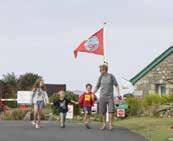
Sennen Cove Club Site, Cornwall
Located on a cliff top overlooking the Atlantic, this is where you’ll get a good dose of sea air. The nearby coastline offers secluded coves and sandy beaches where little ones can run free. This campsite is perfectly situated to explore Land’s End, St Michael’s Mount and St Ives.
Whether you’re looking to explore the miles of sandy beaches across Bournemouth and Poole or go and explore the New Forest National Park, this is the perfect base. There’s also a great children’s playground on site and your dog is welcome too.
To find out more about all these campsites and more, visit www.theoutdoorguide.co.uk/stay/camping-glamping
Editor Karen Sykes editor@familiesmanchester.co.uk 01706 671664
Printed by Buxton PressDesign by Rebecca
CarrNext issue: July/August
Book by: 7 June
Families Manchester is available through nurseries, schools, libraries, selected shops and other points throughout the region. If you would like FREE copies for your organisation, please get in touch.
Are you all set for the warmer weather? Summer is officially just a few weeks away…!
If you are thinking of getting away for a weekend or short break or even planning a holiday during the summer school holidays, check out our ideas for UK campsites you can head to for a fabulous family experience.
Swimming is the only active pursuit that can save your child’s life. Take a look at our article from Swim England about the vital skills your child will learn both at school and private swimming classes.
What birthday traditions do you have to celebrate your child’s birthday? It’s lovely to develop and maintain these as a way of marking the special day each year and we have some lovely suggestions as to how you can do that.
Finally, in this issue, we have a Smoby Flower Market Creations Kit to giveaway! Apply inside. By doing so, you’ll also ensure you receive our digital magazine with lots more content and goodies on offer.
Editor, Families Manchester
January/February issue competition winners Congratulations to all our winners. You can find a list at www.bit.ly/JF24recipients
Families is a registered trademark of LCMB Ltd, Remenham House, Regatta Place, Marlow Road, Bourne End, Bucks SL8 5TD. The contents of this magazine are fully protected by copyright and none of the editorial or photographic matter may be reproduced in any form without prior consent of Families Print Ltd. Every care is taken in the preparation of this magazine but Families Print Ltd, its distributors, franchisees and LCMB Ltd cannot be held responsible for the claims of advertisers nor for the accuracy of the contents, or any consequences thereof.
Dive into a blooming adventure at RHS Gardens this May half term. With outdoor trails to explore, fun planting workshops, craft activities and more, it’s a garden party for the whole family!
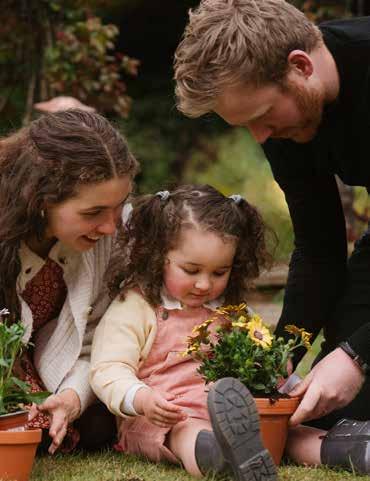
Does your child struggle to remember things they have learnt at school? Cognitive science can help us to understand how our children’s brains work and how they will learn best.
In order to remember, we need to store information in our longterm memory. Around thirty years ago, Australian psychologist John Sweller published a paper which has significantly advanced our understanding of how information passes from the working memory into the long-term memory. The theory that came from his work is called Cognitive Load Theory (CLT) and it is worth having a basic understanding of the theory, so that we can support our children when they are struggling to remember information they learn.
When a child first learns new information, it is held in their working memory. The working memory is limited and if it is overloaded, it becomes very difficult to transfer that information into the long-term memory.
Sweller estimated that only five to nine items can be held in the working memory at any one time. Interestingly, it is thought that the long-term memory is unlimited in its capacity. So, to give your child the best chances of success in both formal exams and in being creative, we must help them to shift information into their long-term memories. Once information is stored there, it can be retrieved when it is needed and has therefore been learnt.
The golden rule is to not overload a child’s working memory. A teaching method called ‘chunking’ is now helping children to

Memorisation has a somewhat bad reputation and can seem out of date. We automatically associate memorisation with dingy classrooms where rote learning takes place: think chanting times tables or learning endless French verb endings.
Instinctively, we want something more exciting for our children than simply memorising information when they are at school. However, in order to be creative, our children do need to memorise information. For example, creativity in story writing cannot occur without a child having information about narratives and banks of exciting vocabulary stored in their long term-memories.
With the whole world of information now available with just a few keyboard taps, thanks to the likes of Google and increasingly ChatGPT, it might be tempting to think that memorisation is not as important as it used to be or even necessary. However, for the reasons explained above and for the fact that our children are still assessed (in SATs and GCSEs) essentially on what they remember, we can conclude that memorisation is as important today as it ever was.
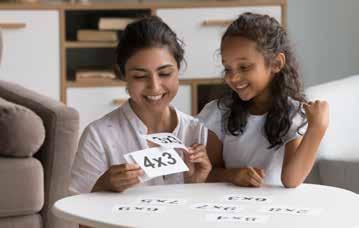
retain information for longer. Chunking involves breaking down information into smaller (bitesize) chunks. By focusing on just one idea at a time, children are able to digest and recall the information.
Whilst this may sound simple and even obvious, breaking down information into chunks can be tricky, as they often need to be even smaller than you might imagine. For example, in answering a question about history, consider how many bits of micro information that your child will need. Try to keep information in the five to nine range.
Ultimately, CLT has helped educators to design learning to support the way that children’s brains work. This is, of course, largely the job of your child’s teacher. However, when parents understand and arm themselves with this knowledge, they can use it to support their child’s learning at home and help them flourish at school.
Erin Miller is a teacher with a keen interest in how research can be used in the classroom to improve learning.
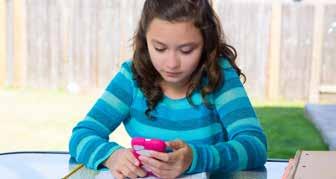
Working memory is proof of our limited attention span. Our children are surrounded by modern technology which can overload their brains. Webpages and apps with lots of functions, images and options are likely to overload cognitive capability; research has shown us that simpler designs work better when it comes to memory.
Therefore, when you’re focusing on getting your child to remember something, try to eliminate distractions. This starts with removing technology. A mini whiteboard at home can be helpful in presenting just one piece of information at a time.
Where technology is necessary for the learning task, ensure only the relevant window is open. When messages or notifications are popping up, this takes up space in your child’s working memory. Multi-tasking is a myth when it comes to learning and remembering new information.
Ultimately, when your child is struggling to understand or remember something, one of the most helpful things you can do is to remove technology and start working on paper.
‘I don’t like reading’ are words parents dread to hear and battle to change and in such households, reading can become a non-negotiable, timed and recorded homework chore. Yet we all strive to mould children who want to read, for pleasure, which becomes increasingly difficult to achieve when we have to compete with modern devices.
So how do we encourage a love for reading and books?
It starts with knowing how to match reading material to the child. When children are given complete free rein in choosing a book, sometimes it can be overwhelming.
Forgive the cliché but they often ‘judge a book by its cover’ or pick a book they find too challenging to actually read and end up giving up on it all together. Children need just as much support in choosing a book as they do reading one.
Try some of these techniques next time they seem stuck in choosing something:
Five finger rule. Ask them to read the first page of a book. If they struggle to read more than five words on that page then the book doesn’t suit them YET!
Try different genres. Not all reading has to be fictional. Expose children to non-fiction in the form of child-friendly newspapers or information text on a subject they might be interested in.
Find an author your child likes and research other works by the same author.

Technology has progressed so much in recent years that playing audio books for children has become easier. Although as parents we would like them to actually read the book, there are many benefits to listening to someone else reading.
Of course, children need to develop the ability to decode words and read independently with stamina. But audio books can be convenient and just as portable as the paper versions. In fact, you can carry more books in your pocket when they are in an audio format and take them anywhere: in the car, bedroom, aeroplane and even the bath!
A narrated story can increase your child’s interest in a book, particularly if different voices narrate the characters.
Audio books also help with language development as children will naturally be exposed to more vocabulary and books that they may not be able to read yet.
Reading along with the audio is a great tip! If you all listen to the same audio book, you can share the same experiences which naturally opens up dialogue.

Listen to the audio version. Listening to someone else read can motivate children to read the book themselves.
Use organisations like Book Trust and CLPE (Centre for Literacy in Primary Education) which have created recommended book lists for different age groups.
Find out what they are reading in school. What other books are similar? Which other books did the same author write?
Meet the author. Getting a signed copy and meeting the author can encourage children to read. Look out for events at your local book shop.
Apply for the Blue Peter Book Badge which requires children to read a book and submit a review.
Zuzu Jordan is a Mastery for Maths specialist who has taught primary aged children for sixteen years and is interested in early years and home learning. For free homework and home learning resources, find her on Instagram at edumate_uk

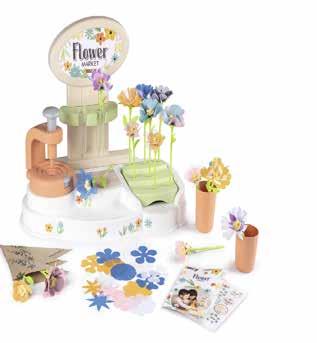
Design and construct flowers with Smoby Flower Market Creations Petals can be re-used plus refill packs available Includes flower press and flower parts
Ages 3+
Many parents worry about their children underachieving or not reaching the expected level by the time they leave primary school or sit 11+ exams but there is good news. By developing your child’s skills it may be easier to improve their performance than you might think.
Research has shown that to be our most effective as learners, we need to develop a specific set of skills known as executive function skills.
Don’t be put off by the name! You have all these skills. Some of you will be brilliant at them, others less so but you will not be a stranger to them.
We are all born with the potential to develop these skills over time but they are not specifically taught as part of the curriculum in school, even though they are critical for effective learning and for everything we do in life.
Where do you start? Self-control, focus and attention, organisation, memory (especially working memory), planning, time management, critical thinking, task initiation, perseverance and flexibility can all be taught.
As a basic minimum, when children go to school, they need to be able to control themselves, concentrate and listen. If any of these skills are weak, it is likely to be flagged up in the child’s school report.
Being able to boil an egg does not mean you can produce a gourmet meal! Likewise, being able to ‘sit up straight, look at the teacher and fold your arms,’ do not alone make you a good listener. Each skill - gourmet cooking AND listening - is a complex series of things we need to co-ordinate to accomplish a result.
By understanding the skills as a process, we can break down everything that needs to happen. For example, to be a good listener, we need to be able to stop what we’re doing, focus and make eye contact. This last may not be easy for children who are overwhelmed by eye contact, so use discretion.

Primary aged children need to feel the skill:
Fill the ice tray (or a glass) with water. Ask your child to carry it to the freezer (or across the kitchen) without spilling a drop. When you see they are completely concentrating, tell them ‘what you are now feeling is called concentration.’ This helps their brain recognise when they are doing it correctly.
Tell your child when they need to concentrate (eg when the teacher is talking) and ask how concentration went each day.

Proper listening also involves cognitive skills: to concentrate, wait, reflect, make connections with reference, take in and sort information and finally, to respond appropriately.
Can your child stop what they’re doing when they’re asked? If not, work on it for a week and tell them that’s the target. Take each part of the process and focus on it until they get it.
Stages to encourage skill development
Define what your child is aiming to achieve; Explain the benefits of growing that skill to your child; Explain the downside of not having the skill in life; Create opportunities for your child to get feedback on how they’re doing with it; Congratulate small successes! The feedback you give your child helps their brain to get it right and consolidate it.
Support your child’s independence by focusing on developing their core skills as they progress through primary school. Find ways to work together with your child to use everyday life for working on the growing skills.
Plan homework; time activities; organise spelling; and practise self-control.
Gail Hugman is proprietor of Lessons Alive (www.lessonsalive. com) and author of A Short and Simple Book for the Why’s, 100 Things to Learn before you’re 10, plus the soon to be published Making the Pennies Drop, which shows parents exactly how to teach key skills to their children.

In general, your child’s skills will naturally develop as they mature during the secondary education years but you can prepare the ground earlier. Here are some tips to help you:
Critical thinking: ask questions about what they’re doing and what they produce. Encourage discussion about what they think.
Task initiation: explain the need to get things done when you are teaching them time management.
Perseverance: point out ‘the bigger picture’ and the steps to keeping going.
Flexibility: demonstrate being adaptable to change.
Vocabulary development is often something that parents mention when they approach a tuition company. Unfortunately, this area of learning does not have a ‘quick fix’ solution. Vocabulary acquirement, retention and application takes a long time.
Children need to be exposed to new vocabulary several times in several different contexts in order to fully absorb it and use it in their own writing and speaking, recognise it in a range of uses and be able to adapt it (for example, adding prefixes and suffixes) when questioned in a test environment.
Vocabulary is a vital aspect of primary education, especially for pupils preparing for entrance exams. A rich vocabulary not only enhances language skills but also serves as a key tool for academic success.
Understanding words in various contexts is fundamental for primary pupils. It allows them to grasp the meanings and usage of words, which helps to improve their comprehension skills.
Additionally, a strong vocabulary assists in spelling tasks, making children more aware of homophones and homographs, thus avoiding common pitfalls in their writing, particularly in time pressured test conditions.
For example, in some verbal reasoning papers, children may be presented with a choice of synonyms to match together: wind, reign, meander. In this example, wind (verb) and meander are synonyms but the child may read it as wind - the noun - due to its position next to a word that sounds like another type of weather but is spelt differently.
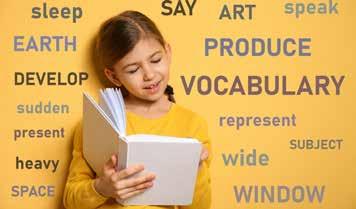
Having a broad vocabulary proves invaluable when preparing for entrance exams as it enables children to infer meanings and understand the overall message of a text without constantly referring to a dictionary, which although a useful skill, can break the flow of reading.
Encouraging reading for pleasure is a powerful strategy to improve and develop children’s vocabulary. Parents should emphasise the importance of reading anything and everything, from storybooks to comic books, menus during meals and signs while out and about. Such diverse reading opportunities expose children to varied language structures and expressions, contributing significantly to the expansion of their vocabulary banks.
If you can convince them to read some of the classic works of Dickens and perhaps some JRR Tolkien, that is great but all reading material can be useful.
Jemma Z Smith is Director of The Education Hotel. For further advice, visit www.educationhotel.co.uk
An independent school for children ages 3-18 years
Assistance with fees available at 11+ and 16+ (means tested), academic and music scholarships
Book online for:
Senior School Taster Days for Year 5 children
22nd May, 23rd May and 19th June
Junior, Senior and Sixth Form school day tours
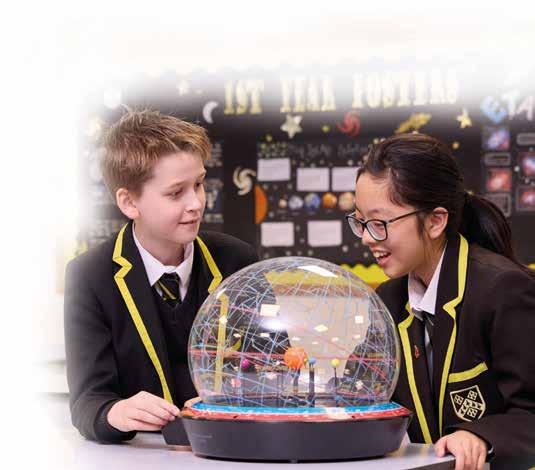
From bustling African cities to the Australian Outback via Asian high seas, these extraordinary stories will transport children around the world, broadening their horizons and inspiring empathy and understanding along the way. The following recommendations are for young readers ages 5 to 12.
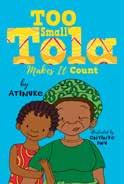
Too Small Tola Makes It Count by Atinuke
Tola may be small but she’s very determined!
This collection of three connected, fun stories feature Tola’s life in bustling Lagos with her clever sister, speedy brother and bossy grandmummy. Discover how there really is no problem too big for Too Small Tola. Ages 5+.

The Last Mapmaker by Christina Soontornvat
Follow Sai, a 12-year-old heroine who is seeking to chart her own destiny in a world of secrets. Taking off for a thrilling high-seas expedition, this is a vivid adventure set in a Thai-inspired fantasy world. Ages 8+.
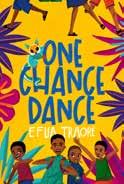
One Chance Dance by Efua Traor
Lagos is no place for a boy and a bush baby but things start to look up when young Jomi meets a crew of street kids and together they come up with a plan. A heart-warming story of friendship, wonder and dance set in lively Nigeria. Ages 8+.

Sona Sharma, Wish Me Luck by Chitra Soundar, illustrated by Jen Khatun
Sona Sharma lives in India with her busy family, where she learns about the ups and downs of family, friendship and life. A warm and gentle illustrated chapter book set in colourful India, packed with empathy and humour. Ages 5+.
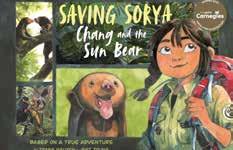
Saving Sorya: Chang and the Sun Bear Trang by Trang Nguyen & Jeet Zdung
Written by scientist and environmental activist Trang Nguyen, this inspirational graphic novel is based on a true story about a young conservationist who overcomes the odds to save a sun bear in Vietnam. Ages 8+.
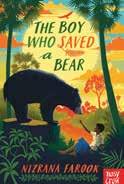
The Boy Who Saved a Bear by Nizrana Farook
A boy and a big, hairy bear meet, become friends and have the adventure of their lives, thwarting the plans of some very dangerous thieves. Young animal lovers will be gripped by this adventure set in a fictional Sri Lanka. Another brilliant escapade from the author of The Girl Who Stole an Elephant. Ages 8+.
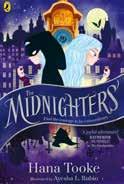
The Midnighters by Hana Tooke, illustrated by Ayesha I. Rubio
A ghostly tale about two friends, one murder mystery and a world of intrigue. I love the mysterious, richly gothicinspired European setting of this entertaining and magical adventure. Find out what it takes to find the courage to be extraordinary. Ages 5+.
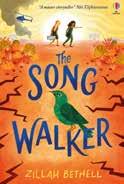
The Song Walker by Zillah Bethel
A girl is found wandering through the Australian outback with mismatched shoes and a violin case. This great adventure with a twist
is an extraordinary, spiritual story of friendship, discovery and courage. Ages 8+.
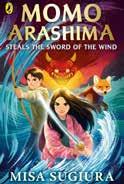
the Sword of the Wind by Misa
Momo just wants an ordinary life but she is half human, half Shinto goddess and evil spirits are threatening to escape and destroy humanity. A thrilling Japanese-inspired fantasy adventure full of action, adventure and even a talking fox. Ages 9+.
Sarah Campbell is co-founder of Parrot Street Book Club (www.parrotstreet.com), an online children’s bookshop offering a handpicked collection of high-quality children’s chapter books, plus an award-winning monthly book subscription for ages 5 to 14.
Did you know that hot water burns like fire? According to the British Burn Association, more than seven thousand children were burned or scalded in 2022 alone in England and Wales. This figure doesn’t include the thousands seen and discharged in A&E. These are the children who were so badly injured they had to be admitted to a Specialist Burns Unit.
Most accidents that cause burns and scalds to babies and children involve hot water. So let’s take a look at the risks within the home.
drinks
Hot drink burns are all too common but easily preventable with these simple rules:
Keep hot drinks out of reach of young children. Place them at the back of the kitchen surface and never on a tablecloth or teatowel that a small child might reach and pull down; Never carry a hot drink whilst carrying a baby; Never pass a hot drink over the heads of children.
Hot water bottles
Hot water bottles can be dangerous and cause burns if they are not cared for or used safely. Rubber deteriorates over time so old hot water bottles can burst or leak and cause serious burns. Check for signs of wear and tear regularly. Look for the flower symbol, which indicates exactly when it was made and don’t use if it’s more than two years old. Never fill a hot water bottle with boiling water.
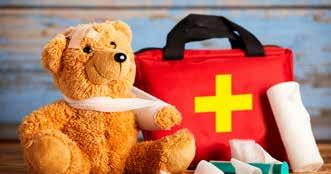
Digital thermometer. The NHS recommends under-arm thermometers for under 5s.
Ice pack. A top tip for when you’re at home is to pop a bag of marshmallows into a plastic food bag and freeze for an instant ice pack. Remember, never put ice directly on the skin; always wrap it in a tea towel before applying the cold compress.
Liquid paracetamol. Don’t forget that you can give your little one pain relief if they hurt themselves in an accident. It’s not just for when they have a fever and are unwell.
Alcohol-free wipes. Use to clean wounds before dressing them. A red flannel. When a child hurts themselves it can be scary to see lots of blood. Having something red to help mop it up can help disguise the severity of more nasty cuts.
It may also be useful to keep a basic first aid manual or instruction booklet with your First Aid kit.

Saucepan and kettle spills
It is important that children are not left alone around hot cooking surfaces; keep them out of the kitchen when cooking or preparing food and hot drinks. Always use the back burners on the hob when you can, turning handles in and keeping kettles and their cords out of reach of little hands.
Baths and showers
Hot water can pose a real danger. Bath and shower water can cause such bad burns that children need years of treatment and may be scarred for life. It only takes one second to get a deep burn in hot water when the water temperature is at 70°C. Always run cold water before hot and test the temperature with the back of your hand. Never leave a child alone in the bath, even for a second.
Jenni Dunman is CEO of Daisy First Aid (www.daisyfirstaid. com) which is an expert in baby and child First Aid. She’s a regular speaker at The Baby Show (www.thebabyshow.co.uk) which returns to NEC Birmingham 10-12 May, Manchester Central 7-9 June and Olympia London 25-27 October.

It is important to act immediately if your child gets burned from any source. The most common sources of burns in the home are hot water and perhaps less predictably, picking up hair straighteners. Here are the steps to follow:
REMOVE any loose clothing or jewellery. Don’t remove anything that is stuck to the skin.
COOL the burn by holding it under cool (not freezing) running water for twenty minutes.
CALL for help by dialling 111 for advice or 999 in an emergency.
COVER the burn using cling film to keep it clean and get it checked by a medical professional. You can buy special burns creams and burns bandages from most pharmacies in the UK.
Finally: consider signing up to a baby and child First Aid course. This will give you practical skills which can make all the difference in an emergency. It’s the qualification you hope you’ll never need.
I once spent a freakishly hot week in the summer holidays learning to sail near the Isle of Wight. As a tween, I was dazzled by the teenaged sailing instructors who seemed endlessly cool. I’m not saying my sailing skills were Olympian but it felt like a modern version of Swallows and Amazons. The sense of freedom and adventure was amazing. My point? Any programme run with experience and enthusiasm can be more than just a childcare solution.
Holiday camps can be daunting and my children enjoy them more if they go with a friend. Perhaps the pandemic made them cautious? Having asked around, it seems they are not the only ones.
Jenny, a mother of a 7 and 9-year-old told me: ‘My kids weren’t interested in going at all but three hours at a tennis camp turned out to be a good first step.’ Half-day camps are a great introduction to camp life.
It’s also important to think carefully before automatically sending siblings to the same camp. ‘Choose carefully!’ warned Maggie, who has two girls with very different interests. ‘I sent both of mine off to the same sports camp. At the end of the first day, one came home on top of the world, the other refused to go back.’
If it is your child’s first time at a summer camp, you can ease their worries by choosing something that really dovetails nicely with their hobbies and personality.
If you think a tech camp might hit the mark, try something with a more specialist focus on robotics, coding and inventions. Next Thing Education run programmes across the UK led

If your child is under 11-years-old, you may qualify for a Tax-Free Childcare account (which you can set up on the Government Gateway website). The government contributes £2 for every £8 you put into the account. To spend the money on a summer camp you will need your unique reference number from your account.
Many camps still accept childcare vouchers. The schemes are closed to new applicants but are still valid if you joined on or before 4 October 2018.
The Summer Camps Trust (www.summercampstrust.org) charity aims to make residential summer camp as normal for UK children as it is for kids in the US. Offering access to kids from all backgrounds, their Tryout camps offer reduced rates for first timers.
The Holiday Activity and Food programme (HAF) is a government-funded holiday camp programme offering free places to any child who is eligible for free school meals. Head to your local authority website and search for HAF. Note that each area has a different name for its HAF funded programmes.

by professional creators, inventors and tech enthusiasts. The children learn creative, technical and logical skills. See www.nextthing.education for details.
For outdoorsy kids, summer is the perfect opportunity to immerse them in the most inspiring local scenery.
Do you live near a woodland? Forest Schools are ideal for nature loving kids, encouraging play alongside learning bushcraft skills, all in a natural setting. You can find your nearest by looking on the database of the Forest School Association which ensures site leaders have Forest School L3 qualifications or equivalent. Visit www.forestschoolassociation.org for details.
If you are heading to the coast for a holiday or even a short break and your child can swim and enjoys being in the water, a surf school is a good option to consider. Surfing England (www.surfingengland.org) has a list of more than fifty accredited surf schools and coaches. They’ve also created the Grom Squad programme for kids to learn about protecting the environment and sea safety.
Ellie is a mum of two daughters, living in Surrey.
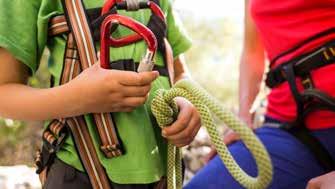
Here are some important questions to ask when choosing a camp.
Is it Ofsted registered? If it runs for more than four hours in one day, Ofsted registration is compulsory.
What is the ratio of staff to children? For children ages 3 to 8, the camp should have a 1 to 8 ratio. For children ages 8+, a 1 to 10 ratio is recommended.
Ask if staff are enhanced DBS checked (Disclosure and Barring Service, formerly the Criminal Records Bureau or CRB) and who is the designated safeguarding lead.
If high-risk activities are included, double check the camp is accredited by the relevant association.
Check the instructors and staff have the relevant qualifications for the activities. Many camps employ teens who add a fun dimension but they should always be overseen by professionally qualified staff.
How does it handle medications and food allergies? What are the procedures if your child becomes ill or in an emergency? Will there always be a trained first aider on site?
Learning to swim is the only physical activity which can save your life.
In recognition of this, all schools must provide swimming lessons in Key Stage 1 or 2 (ages 5 to 11), as a statutory sport within the Physical Education (PE) curriculum.
In particular, pupils should be taught to perform safe selfrescue in different water-based situations; swim competently, confidently and proficiently over a distance of AT LEAST 25 metres and use a range of strokes effectively, for example, front crawl, backstroke and breaststroke.
However, Swim England recommends that your child doesn’t give up on regular private swimming lessons once they start swimming with school as these are crucial to their continued development and ultimately safety.
The aim of school swimming and water safety lessons during PE are to teach your child to be safe in and around water, with the emphasis on water safety.
At private lessons, your child will be taught more in-depth skills and techniques than they will at school. Regular private lessons progress way past the minimum national curriculum requirements and your child continues their aquatic education towards an active and healthy future.
What will my child learn during school swimming?
As well as learning to swim the basic strokes, your child will learn how to be safe around different water environments eg beaches, lakes, canals. Your child will be taught how the skills they learn in their swimming lessons can be used in an emergency situation.

Swimwear. Check school guidelines on the swimwear permitted. Towels. Two can be good!
Swimming cap. Keeps long hair out of the face and reduces ‘drag’ to make swimming easier.
Goggles. Ideally pupils need to experience swimming without goggles; if your child falls into a lake they won’t have goggles and may panic. If you think your child needs to wear goggles, discuss with their school.
Toiletries. Pack shampoo, conditioner, shower gel etc to wash off pool chemicals.
Hairbrush/Comb. Hair clips/bands are useful if swimming without a cap.
Locker coins. If lockers will be used, ask whether they require coins or a token.
Water. In a pool, children won’t notice how much they sweat. Give them a water bottle, remind them to keep it poolside and take regular sips.
Snack. Depending on school rules, a small snack like a banana for after their lesson will help replace energy. Jewellery. This should ideally be removed for safety.

As a parent, guardian or carer you play a vital role in encouraging your child to swim and learn about water safety, survival and lifesaving. You can help your child grow their water confidence through enjoying fun family swimming sessions together and also talking about water safety know-how.
Make sure your child has everything they need to take part in their swimming lessons and also find out what their current attainment level is and what they should be achieving.
If you are in a Parent Teacher Association (PTA)
You have an important role to play. Children who don’t learn to swim at school often never learn at all. In your regular meetings, you can encourage and support your school to sign up to the Charter and take swimming and water safety seriously, as well as making sure it stays on the agenda.
For further information, visit www.swimming.org

According to latest BBC figures, home-schooling in the UK has increased forty percent in the past three years. Parents who home school must ensure their children receive provide a broad and balanced, full-time education from age 5. Whilst you don’t have to follow the national curriculum, you will almost certainly want your child to learn to swim to its required standards.
Swim England recommends your child completes the Swim England School Swimming and Water Safety Charter, to be competent and confident in all water environments and proficient in all the swimming strokes.
This will ensure they can swim the minimum required twenty five metres by the time they would normally leave primary school. Swim England also suggests enrolling them in regular lessons that follow the Swim England Learn to Swim Programme, as well as participating in water safety campaigns such as Swim Safe. Talk to your local lesson providers about the potential for taking part in bespoke school swimming lessons. For more information about the PE curriculum, visit www.gov.uk/national-curriculum.





In a world where compassion and empathy are invaluable qualities, parents play a crucial role in shaping their children into responsible and caring individuals. Engaging in social action with your children helps to instil these lifelong values and more. Plus it can be a great way to spend quality family time. Here’s how you can meaningfully involve your kids in social action.
Never too young to talk
Start conversations early. While young children might not grasp complex global issues, introducing the concept of kindness, empathy and helping others sets the foundation for a compassionate mindset. Use age-appropriate language and share stories that illustrate the power of positive actions.
Maximise everyday kindness
Use everyday activities. Teach your children the significance of small acts that make a difference, like picking up litter or turning off lights. These simple actions help normalise active citizenship.
Lead by example
Children learn best through example. Showcase the values you want to instil by actively participating in social action yourself. Whether giving to a charity, helping a neighbour or volunteering your time, your actions provide a powerful model for your kids to emulate. Wherever possible, take the opportunity to include your children in the activity. For example, if you are donating to charity, explain why you chose the charity and what impact your donation may have.
Explore different ways to help
Expose your children to a variety of social action opportunities such as going on litter picks or writing to MPs about causes they care about. This not only broadens their understanding of societal needs but also allows them to discover where their passions lie in making a positive impact.
Empower children to choose
Invite your children to choose a cause that resonates with them. Support them in researching, investigating and exploring different areas of interest. This empowers them to take ownership of their social action and enhances their critical thinking skills.
Commit to it
Establish a dedicated time for social action in your family routine. This commitment can be reinforced through accountability

10-year-old Liam Hannon’s dad set him the challenge of doing something to give back to his community. After some discussion, Liam settled on helping homeless people. He enlisted his dad to help him make and distribute sandwiches, each with a special handwritten note or drawing.
By spreading the word to friends, family and through social media, donations and offers of help poured in. The duo has gone from distributing forty bags in their first week to hundreds of bags per week!
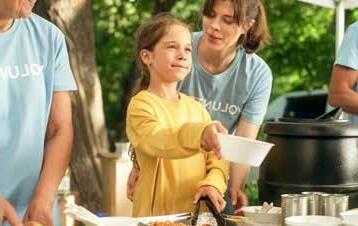
measures, such as creating a charity jar that accumulates funds in response to helping with chores around the house. This encourages consistency and also reinforces the value of sharing one’s time, treasure and talent to help others.
Make traditions
Incorporate social action into family traditions. Whether it’s creating Christmas shoeboxes, donating to a food bank or including a charity birthday wish list, these traditions instil a sense of purpose and giving that extends beyond individual actions.
Reflect and celebrate
Social action should not be a one-off event. Keep the conversation alive by discussing ongoing initiatives and celebrating their impact. This continuous dialogue helps children understand the long-term impact of their actions.
Spending time working towards a shared goal is a brilliant way to strengthen family connection. When that shared goal helps others, such as in the case of social action, you are also helping to nurture compassionate, responsible and socially aware individuals. These values will last for life; research shows that young people who engage in meaningful social action are twice as habitually philanthropic in later life.
So by following these practical steps, you are actively shaping the next generation of change-makers!
Anoushka Freeman represents www.superkind.org, the social action and charity platform for young people who want to be change-makers. Find free resources to help young people learn, be inspired and get empowered to make a positive difference to their communities and the world.

Studies have shown that social action has a vast array of benefits for young people who take part in it. It builds empathy, resilience, leadership and teamwork. It has been linked to higher grades and lower truancy and can help hugely with employability.
Research from the Cabinet Office showed that engaging in social action lowered anxiety levels in young people by over twenty percent. It’s even been shown to chemically contribute to happiness levels through the release of endorphins – the socalled ‘helpers’ high.’
All listings are correct at the time of publication. Please check with the venue before you visit in case anything has changed.
Until 23 June
Shaun The Sheep Find The Flock at Tatton Park, Cheshire Spring into baa-rilliant adventures with Shaun The Sheep on a colourful arts trail in the blooming gardens. tattonpark.org.uk/events_at_ tatton_park/event-listings/2024/ march/shaun-the-sheep-find-theflock-at-tatton-park.aspx
19 & 30 May
East Lancashire Railway, Bury
It’s time to sign up to our spellbinding school of sorcery as you take a wacky and wonderful whistle stop tour of the Wizard Academy and learn to become a master of mystery and magic. A perfect adventure for children aged 5–12. eastlancsrailway.org.uk/ events-activities/the-wizardingadventure
24-27 May
Segway Experience at Tatton Park, Cheshire
Try a Segway experience, environmentally friendly, fun-filled machines create a great day out. segwayevents.co.uk/locations/ manchester-tatton-park
From 25 May
Dunham Massey
At Dunham Massey, families and friends are encouraged to harness the vibrancy and joy of longer warmer days, with a playful, threemonth celebration of summer. FREE with admission. nationaltrust.org.uk/dunhammassey
25 May-2 June
Family Gardening Festival at RHS Garden Bridgewater
This half term plant a lifelong adventure with gardening by visiting the Family Gardening Festival, in collaboration with Burgon & Ball. There will be a mix of fun activities including crafts, planting sessions and a garden adventure trail. Normal garden admission applies – FREE for RHS Members.
25 May-9 June
Wild West at Cockfields Farm, Ashton under Lyne Saddle up partners and step into the Wild West for a thrilling family fun day at Cockfields Farm, Ye Ha!! cockfieldsfarm.digitickets.co.uk/ tickets
26 May
Rude Science! at The Lowry, Salford
The naughtiest, funniest, most revolting science show in the world. Find out more and book. thelowry.com/whats-on/rudescience
28 May
Story Time With Goats at Failsworth Library hla.oldham.gov.uk/event/storytime-with-goats
28–30 May
Pirate School at Z Arts, Hulme www.z-arts.org/events/pirateschool-5-7
28 May–Sat 1 June
The Very Hungry Caterpillar Show at The Lowry, Salford thelowry.com/whats-on/the-veryhungry-caterpillar

This May half-term, the Royal Horticultural Society (RHS) plans to plant a lifelong adventure with gardening by inviting young visitors to RHS Garden Bridgewater in Greater Manchester to dig, plant and play at the Family Gardening Festival from 25 May to 2 June.
In collaboration with Burgon & Ball and their ‘Growing Gardeners’ range of tools and accessories for family gardening, there will be a mix of fun activities for young visitors, including crafts, planting sessions and a garden adventure trail.
Plan your day out at www.rhs.org.uk/bridgewater

30 May
Princess Live at Albert Halls
Bolton
Princess Live is the ultimate princess pop party, featuring your favourite fairytale royalty in this all singing all dancing hour long concert show. alberthalls-bolton.co.uk/event/ princess-live/2024-05-30
31 May
East Lancashire Railway, Bury
Join a rogue’s gallery of vile villains on a journey to complete a dastardly quest. eastlancsrailway.org.uk/eventsactivities/villain-academy
15-16 June
DogFest at Tatton Park Cheshire Dog lovers and anyone who just loves a fantastic day out, it’s time! DogFest is back and bursting with wonderful activities for you to enjoy with the whole family, four-legged included! dogfest.seetickets.com/content/ show-options
15-16 June
Stunt Bikes at Cockfields Farm, Ashton under Lyne Experience the thrill of jawdropping stunts and gravity-defying tricks as skilled stunt riders take centre stage in an electrifying display of bike mastery. cockfieldsfarm.digitickets.co.uk/ tickets
22 June
Pretty Muddy Kids at Tatton Park, Cheshire
A brilliant muddy obstacle course just for children. raceforlife.cancerresearchuk.org/ find-an-event/tatton-park-prettymuddy-kids-2024-06-22-1000
22 June
Trash Test Dummies Circus at The Lowry, Salford thelowry.com/whats-on/trashtest-dummies
29 June
The Showstoppers Kids Show at The Lowry, Salford thelowry.com/whats-on/theshowstoppers-kids-show
6 July
Milkshake Live On Holiday at Stockport Plaza stockportplaza.co.uk/whats-on/ milkshake-live-on-holiday
6–7 July
Classic American Stars & Stripes Car Show at Tatton Park, Cheshire
Celebrating all things american from across the decades in this Classic American Stars & Stripes Car Show. tattonstarsandstripes.com

Open Farm Sunday on 9 June provides a unique opportunity for families to explore real working farms and learn more about the countryside.
Managed by LEAF (Linking Environment And Farming), this annual event allows families and individuals to witness daily farm activities, engage with passionate farmers and learn about sustainable practices. Visitors can enjoy tractor-trailer rides, farm tours, nature trails, bug hunts, and even shop at farmers’ markets.
To find a farm opening their gates near you, visit www.farmsunday.org
The lovely thing about birthday traditions is that they don’t have to be big and expensive to be really fun and meaningful. They’re all about creating lasting memories and providing the perfect opportunity for a family photo, captured every year to see your family grow and change.
In our household, we have a ‘birthday book’ for our daughter. Every year we fill out a new page with what makes her special; from her favourite food or toy, to what she wants to be when she grows up. It’s going to make a lovely book to look back on in years to come! She also opens her presents first thing in the morning, before we’ve even got out of bed. Later, we’ll eat out with wider family members, at the favourite ‘fancy’ restaurant that we always go to for birthday celebrations.
Another great bonus of family traditions is that they can potentially replace the need for an all-singing, all-dancing birthday party. Sometimes quality time with the ones we love is more than enough and parties can take a back seat.
Here are a few fun ideas for you:

Add decorations and leave their presents at the end of your child’s bed, while they sleep. A lovely surprise when they wake!

Write your child a letter every year for their birthday, for a lovely keepsake when they are older. Or they could write something each year for a time capsule of their letters and drawings.

Write little post-it notes for the birthday child and hide them round their room, the house, in their school bag and their lunchbox.

Ask the birthday child to donate a toy of theirs to charity before they receive any new gifts. It’s a lovely way for them to acknowledge how lucky they are to receive gifts on their birthday and also clears some space to accommodate any new gifts.

Prepare a fantastic birthday breakfast feast, such as piles of pancakes covered in fruit, syrup and cream. Or maybe just start the day the best way - with birthday cake!
Something they want, something they need, something to wear and something to read. Gifting the birthday child with these is a lovely way to celebrate a birthday in a more grounded way.


Plan a scavenger hunt around the house and garden and ask the birthday child to solve clues in order to hunt down their gifts.

Offer a ‘yes’ day, where you agree to all requests from the birthday child. You may want to have a few ‘safety’ caveats for this day, to ensure certain requests are out of bounds.

Send their birthday card in the post, even if you are all at home; it’s always fun to receive mail.
At a time when we are all trying to reduce the amount of plastic we consume, it seems toymakers and our little ones are against us every step of the way, filling our homes with plastic toys and gadgets everywhere we look. Moreover, these colourful and joyous pieces of plastic often provide precious little fun before they are pushed aside for the next in line.
When the inevitable birthday party season comes along, gifting something that is a little kinder to the planet might also provide some longer lasting fun.
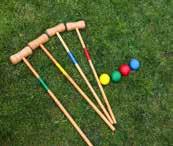
Garden games are a long standing favourite gift. They are great for getting kids outside and provide the opportunity for lots of family fun. Lovely wooden games such as quoits, Jenga and skittles will provide years of fun and last a lifetime.
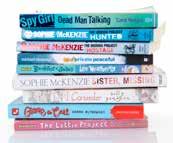
Books are often overlooked but can be such meaningful and enjoyable gifts. Favourite stories can be read and loved again and again and then passed onto siblings, friends or the next generation. Alternatively, a book token gives children the fun of browsing a real bookshop.
No presents! If you are having a party for your child, you may just want to ask for no presents at all, if you feel your child has more than enough. Alternatively, ask everyone to bring along a book that they have enjoyed reading and then do a book swap, so everyone goes home with a gift.

Preloved gifts are also a great option. As children often outgrow their toys before they really get a chance to play with them, you can find plenty of preloved toys that are like new. You save money, kids barely know the difference between new and preloved and aren’t bothered anyway. Try nearly new sales, charity shops or school fairs. If you’re short on time, www.rumage. com can search all your favourite marketplaces for you and filter by location so you can find a seller nearby, saving on postage.
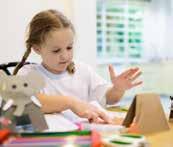
Lasting gifts. A subscription is a gift that keeps on giving, perhaps a monthly magazine or a craft box.


Non-physical gifts. Instead of stuff and more stuff, consider a fun day out or an experience that the whole family can enjoy or some dance, music or sports classes. Another idea is an annual (family) membership to a local amusement park, museum or similar, which means your gift can be enjoyed again and again throughout the year.

‘Fiver’ parties are also rising in popularity and it’s easy to see why. They reduce the pressure on parents to search for the perfect gift and also mean the birthday child can use the combined monies to buy a meaningful gift that they would really like.

Handmade and upcycled presents add a really personal touch. You can make something bespoke that will be unique to the lucky recipient. Previously I’ve upcycled a scooter and a guitar for my daughter, which have been loved and adored.
Whatever gift you decide to go with, by consciously avoiding new plastic and making sustainable choices, your biggest gift will be to the planet - and thus the future of the birthday child. What more could they ask for?